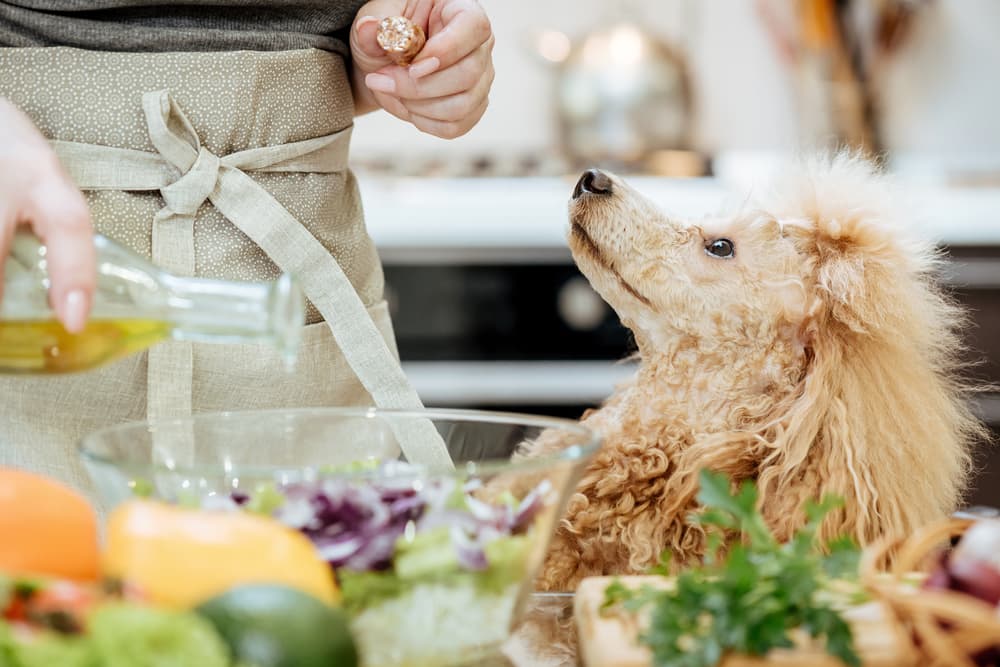Blog

7 Superfoods Both You and Your Dog Can Enjoy

Who doesn’t like a delectable treat? While you may like sharing human meals with your dog, a large number of them are not good for your pet’s digestive tract. The majority of human meals are indigestible to dogs, and many include hazardous chemicals such as xylitol. However, there are a few healthful foods, referred to as superfoods in the human world, that are as delicious and nutritious for your dog. Consume one of these safe treats in moderation with your pooch if you’re compelled to succumb to their begging puppy dog eyes.
kale
1. Kale
Kale is a nutritious leafy green vegetable that is high in vitamins A, C, and E. Additionally, it contains antioxidants that assist maintain the function of the liver and aid in the clearance of toxins from the body. While kale is more beneficial than pleasant for many people and dogs, it does not mean you cannot discover ways to enjoy it. Combine it with your favorite non-dairy milk and fruits to make a smoothie. In a similar method, your dog may consume it. Make certain to use organic, well washed kale. It can be pureed boiled, steamed, or raw, but no spices, herbs, or oils should be added. Consume sparingly and avoid providing it to dogs with bladder stones or renal illness.
2. Blueberries
Blueberries are a superfood that are so popular with dogs that they are available in treat form. According to some scientists, the blueberry is the most nutritious of all berries. They are abundant in antioxidants and have anti-inflammatory effects, which benefit your dog’s urinary tract health. Additionally, some studies feel that blueberries benefit your dog’s brain and memory function (not to mention your own). If your dog frequently begs for “human food,” blueberries make an excellent substitute. Serve them straight or together with plain yogurt for you and your pet.
3. Carrots
Beta-carotene is a carotenoid antioxidant present in orange fruits and vegetables such as carrots. Carrots can help enhance your immune system and improve your skin and hair. Additionally, carrots are high in fiber, making them a good alternative for constipated dogs. You probably already consume carrots in a number of ways, but keep in mind that spices and oils are not beneficial to your dog. Feed him carrots uncooked in bite-size chunks or purée them into his diet. Naturally, you can also get dog treats made with carrots.
4. Fish
When you consider dog food, you are unlikely to think of anchovies or sardines. Even if you dislike them, these little fish are packed with beneficial nutrients for your pup. Fish are abundant in Omega-3 fatty acids, which boost the health of your dog’s skin and hair and contribute to brain, heart, and joint function. Sardines and anchovies are also abundant in calcium, which helps maintain bone health. Select canned fish that is wild-caught and packaged in salt-free water. Serve them as a snack or grate them into your dog’s regular diet. Smaller dogs should have no more than three anchovies each day, while larger dogs should consume up to five.
5. Pumpkin
Pumpkin is another delicious orange treat that is excellent for your pet. As with carrots, beta-carotene found in pumpkins and pumpkin sweets aids in digestion and helps reduce constipation and diarrhea. Additionally, pumpkin is packed in vitamins, iron, and calcium, all of which promote eye health and a stronger immune system. Cooked pumpkin may be added to your dog’s meal or canned pumpkin can be used. If you’re using canned pumpkin, be certain it’s pure. Pumpkin pie filling includes potentially hazardous amounts of sugar and spices. Finally, if you’re carving pumpkins this fall, you may roast the seeds and give them to your dog as a treat.
6. Bone Broth
Bone broth is a nutritious and delectable option for both you and your pet. Whether you make your own broth, purchase it at a shop, or purchase bone broth dog treats, it provides a plethora of advantages. Broth is a good source of protein, which helps keep both you and your dog healthy and strong. Additionally, it contains amino acids, minerals, and vitamins that aid in the anti-inflammatory process. Additionally, the bones used to make broth include gelatin, which increases the amount of glucosamine and chondroitin required for your dog’s and your own joint health. Bone broth has been shown in studies to decrease the course of joint illnesses such as arthritis. Feed a few teaspoons to your dog daily.
7. Yogurt
Yogurt has long been recognized as a source of beneficial bacteria for humans. Probiotics promote intestinal health, allowing you to digest meals more effectively and feel better throughout the day. Greek yogurt, in particular, is a good source of protein and may even help build a stronger immune system. According to research, the same reasons you should consume yogurt apply to your dog. Add a spoonful or two of plain, unsweetened yogurt to your dog’s meal or serve it alongside blueberries or another item on this list. Because some dogs have difficulty digesting yogurt, only offer modest amounts to avoid issues.
Bear in mind that all meals, including superfoods, should be consumed in moderation. The optimum diet for your dog is a combination of a nutritious, vet-approved dog food and an occasional treat. Consult your veterinarian before introducing new foods to your dog, and never feed your pet chocolate, grapes, raisins, or onions. Finally, remember to chop big objects into smaller pieces to avoid choking dangers. Now comes the difficult part: picking which goodie to share first with your pooch!























